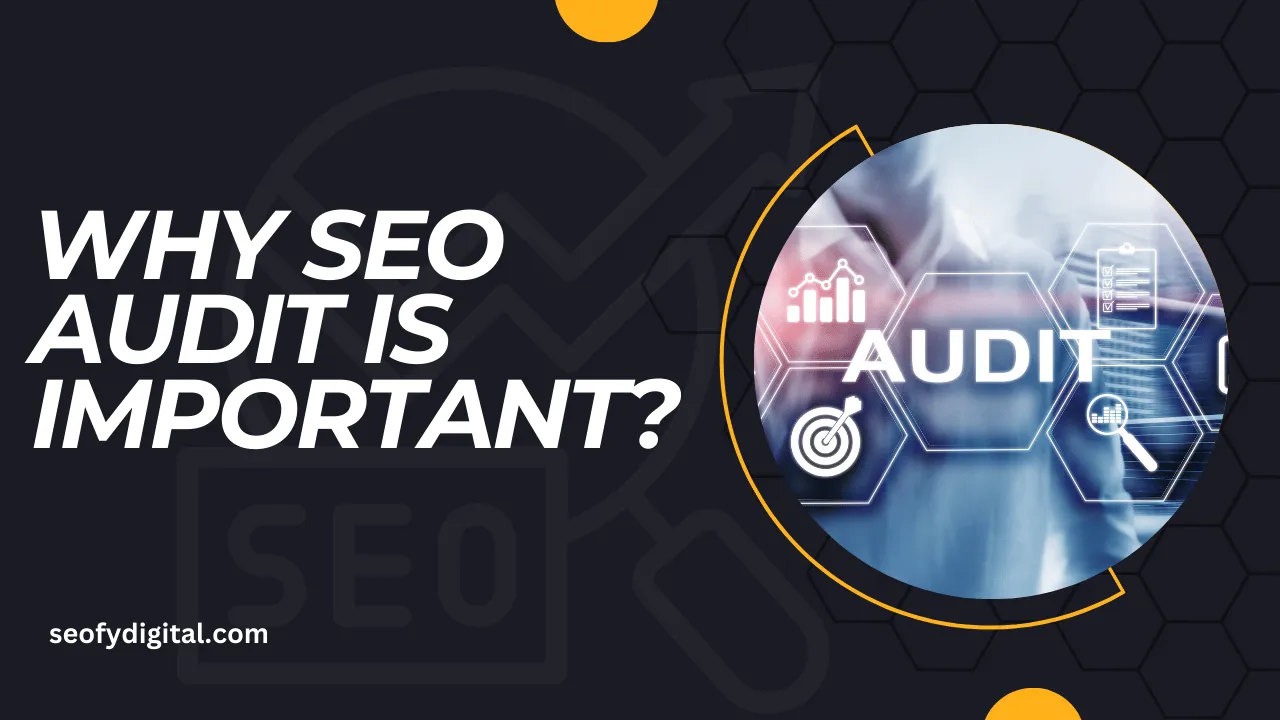With 93% of online experiences beginning with a search engine, an SEO audit is more than a luxury; it’s a necessity. As businesses strive to rank higher in search results, they often face common hurdles like reduced traffic and lower rankings.
But what’s the missing link? An SEO audit. This process gives a complete overview of your website’s performance, identifying what’s working and what isn’t, from a technical, on-page, and off-page perspective.
Most websites encounter a range of issues, from broken links to outdated keywords, and an SEO audit identifies these problem areas, providing actionable insights. Think of it as a health check-up for your website, ensuring your digital marketing strategy is backed by a strong foundation.
In this guide, we’ll explore the components, benefits, and steps of a thorough SEO audit and why it’s crucial to keeping your site competitive.
This article will walk you through SEO basics, the purpose and steps of an SEO audit, and how to avoid common mistakes, setting you up to maximize your site’s performance. So, let’s dive into the essential aspects of an SEO audit and how it can elevate your digital presence.

Contents
Understanding the Basics of SEO
What is SEO?
SEO (Search Engine Optimization) is the process of enhancing your website’s visibility on search engines like Google. The main components of SEO include on-page SEO, off-page SEO, and technical SEO.
On-page SEO covers elements within your site, like keywords and content optimization. Off-page SEO involves link-building strategies, while technical SEO focuses on site performance factors like load time and structure.
How SEO Works
Search engines crawl, index, and rank web pages based on relevance and quality. Crawling is the discovery phase, indexing is storing pages in the search database, and ranking is determining where a page appears in search results.
Search engines consider various factors like content quality, backlinks, and page structure in ranking decisions.
The Importance of SEO
Good SEO enhances organic traffic, brand visibility, and authority. Ranking well for relevant keywords places your website in front of your target audience, leading to increased traffic, conversions, and a stronger brand presence. SEO is a long-term strategy that consistently brings visitors without paying for ads, making it both impactful and cost-effective.
The Purpose of an SEO Audit
Identifying Strengths and Weaknesses
An SEO audit uncovers areas where your site excels and reveals areas that need improvement. It’s a chance to spot underperforming content, missing meta tags, and broken links that harm user experience and SEO rankings.
Discovering Technical Issues
Technical issues such as slow page speed, broken links, or poor mobile optimization negatively impact user experience. SEO audits highlight these problems, helping you address them and improve overall performance.
Uncovering On-Page SEO Opportunities
An SEO audit reveals areas for keyword optimization, such as title tags, meta descriptions, and headers, helping boost visibility and relevance in search results. These adjustments lead to higher engagement and improved rankings.
Assessing the Backlink Profile
A strong backlink profile builds authority, while toxic backlinks can penalize your site. Audits analyze your backlinks, identifying high-quality ones that enhance SEO and toxic links that may harm your reputation.
Monitoring Competitor Performance
SEO audits allow you to study competitors’ SEO strategies, showing where they excel and helping you pinpoint opportunities to outperform them. This insight refines your approach and strengthens your competitive position.

The SEO Audit Process
Step 1: Crawl and Indexation
Crawling and indexing are crucial for ensuring that search engines find and store your website pages. An SEO audit reviews your crawl status and identifies indexing issues like duplicate content or broken pages, helping search engines accurately assess your site.
Step 2: On-Page SEO Audit
In this step, an audit assesses title tags, headers, meta descriptions, and content quality. Well-optimized on-page elements improve visibility and engagement, making it easier for users and search engines to understand your content’s relevance.
Step 3: Technical SEO Audit
Technical SEO includes factors like page speed, mobile-friendliness, and XML sitemaps. These elements are essential for user experience and search engine accessibility. Technical audits ensure your site is well-structured and fast-loading.
Step 4: Off-Page SEO Audit
Backlinks and external factors influence SEO, so an off-page audit checks your backlink profile and link-building opportunities. High-quality backlinks improve authority, but low-quality or spammy links can hurt rankings.
Step 5: Competitive Analysis
Competitive analysis lets you study competitors’ SEO strategies and identify gaps where you can improve. This step helps refine your SEO plan by learning from what works for others in your industry.
The Benefits of Regular SEO Audits
Improved Search Engine Rankings
Regular SEO audits help you stay up-to-date with SEO best practices, leading to higher rankings. Identifying and fixing weaknesses boosts your site’s relevance, helping it rank higher.
Increased Organic Traffic
Better rankings naturally lead to increased organic traffic. More visibility attracts more visitors, reducing the need to rely on paid advertising.
Enhanced User Experience
An audit fixes technical and on-page issues, creating a smoother user experience. Engaged users are likely to stay longer on your site, increasing the chance of conversion and lowering bounce rates.
Cost-Effective Marketing
SEO is a cost-effective strategy. By investing in regular audits, you ensure your website remains optimized, attracting visitors without paying for ads, which provides long-term value.
Long-Term ROI
SEO provides compounding benefits over time. Regular audits help you maintain SEO momentum, building authority gradually and ensuring long-lasting digital presence.
Common SEO Audit Mistakes to Avoid
Ignoring Mobile-First Indexing
Google prioritizes mobile-friendly sites, so ignoring mobile-first indexing can result in lower rankings. A mobile-friendly website enhances user experience and search performance.
Overlooking Core Web Vitals
Core Web Vitals measure load speed, interactivity, and visual stability, which impact user satisfaction. Slow or unstable sites frustrate users and harm rankings, making this metric critical.
Neglecting Local SEO
If your business serves a local area, local SEO is essential. Skipping this step can result in missed opportunities with potential customers in your location.
Failing to Monitor Backlinks
Toxic backlinks can harm your site, so failing to regularly check your backlink profile could lead to penalties. Monitoring backlinks safeguards your reputation and rankings.
Not Keeping Up with Algorithm Updates
Search algorithms evolve frequently, and ignoring updates can lead to outdated SEO practices. Regular audits help you adapt to these changes and maintain effective SEO strategies.
Conclusion
SEO audits are essential for any business aiming for sustainable online growth. A comprehensive audit assesses your site’s health, enabling you to optimize content, fix technical issues, and outperform competitors.
The insights gained from regular SEO audits lead to increased visibility, higher rankings, and an enhanced user experience.Regular audits also ensure you’re using current SEO best practices, helping you stay competitive in an evolving digital landscape.
By investing in professional SEO services or scheduling frequent audits, you can secure a consistent flow of organic traffic, improving your online presence and providing long-term returns.
FAQs
1. What is an SEO audit?
An SEO audit is a thorough assessment of a website’s SEO health, covering on-page, off-page, and technical aspects to identify issues and improvement areas.
2. How often should I perform an SEO audit?
Ideally, conduct an SEO audit every 3-6 months, or when you make significant changes to your website or when there’s an algorithm update.
3. What tools are used in an SEO audit?
Tools like Google Analytics, SEMrush, Ahrefs, and Screaming Frog are used to examine technical performance, backlinks, keywords, and overall SEO health.
4. Can I do an SEO audit myself?
While DIY tools exist, professional SEO audits offer more detailed insights. For maximum effectiveness, expert audits are recommended.
5. What is the first priority after an SEO audit?
Start by fixing critical technical issues, then move to on-page elements like title tags and meta descriptions to improve your site’s relevance and accessibility.
6. Do small businesses need SEO audits?
Yes, small businesses benefit significantly from SEO audits, which help them compete locally, attract relevant audiences, and improve online visibility.








